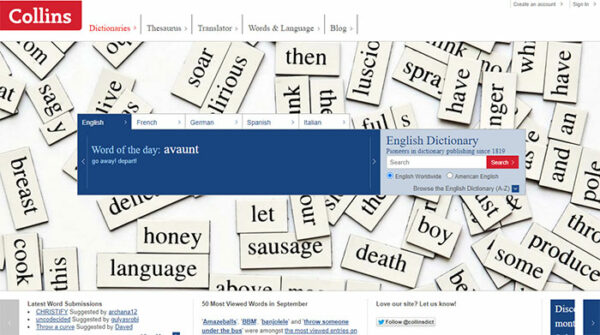Every word that enters the Collins Dictionary is reviewed by our editors before inclusion. Whether it’s a word that has been floating around the verges of common parlance for years, or one that you’ve just coined and submitted yourself, the word will always go through this review process.
Our editors look for objective evidence to decide which words deserve to be included. This evidence is based on our 4.5-billion-word database of language called the Collins Corpus. The words in the Corpus are taken from a huge range of sources of spoken and written English, including newspapers, radio and now, social media, from all over the world.
Generally, the more frequently a word is used, the more likely it is to be included in the dictionary. Other factors are considered though, such as how widespread its use is, whether it can be found in multiple sources, and how long it is likely to stay around for.
Every word has to prove itself worthy of a place in our dictionary. That’s what makes www.collinsdictionary.com so special!
How can I submit my own word for the dictionary?
How can I improve my word’s chances of making it in?
This is a journey that every word has had to take at some time or other. The road is hard and full of pitfalls, but you can give your word a helping hand by following these tips:
– When you submit a new word can enter some additional information that might help our editors. Reasons like ‘My friends and I find it funny’ or ‘It would help me win at Scrabble’ won’t impress them. Example sentences and word origins are helpful though.
– Usually, the more times a word has been used, the more likely it is to be included. But if your word is only used by a small group of people, or over a small period of time, the editors are going to need some extra evidence to be convinced. A higher number of overall uses could make your word worthy though, so keep trying!
– It’s a sad fact that sometimes words are removed from the dictionary due to neglect. Don’t blame our editors, but they are constantly working to ensure that the Collins Dictionary reflects current language use. If your word turns out to be a flash-in-the-pan, one-hit-wonder it may not last long. Keep it useful, keep it in use.
How long does it take for a new word submission to be approved?
So, you’ve got your word, you’ve submitted it, and you’ve told all your friends that it’s going to be in the dictionary (you hope!). How long do you have to wait?
Well, our editors are only human, so if they’re very busy it might take them two or three weeks to provide feedback on your word. Not long in the grand scheme of things and, if your word is accepted, it won’t be much longer before it has its own page and definition on www.collinsdictionary.com.
Of course, if the news isn’t so good, don’t worry! We’ll keep a record of all the words we think have a chance of inclusion, and we’ll continue to monitor and review their progress over the coming year. So now you can send your word off on its journey, reassured that it’s in safe hands with Collins.
Godspeed little word!



